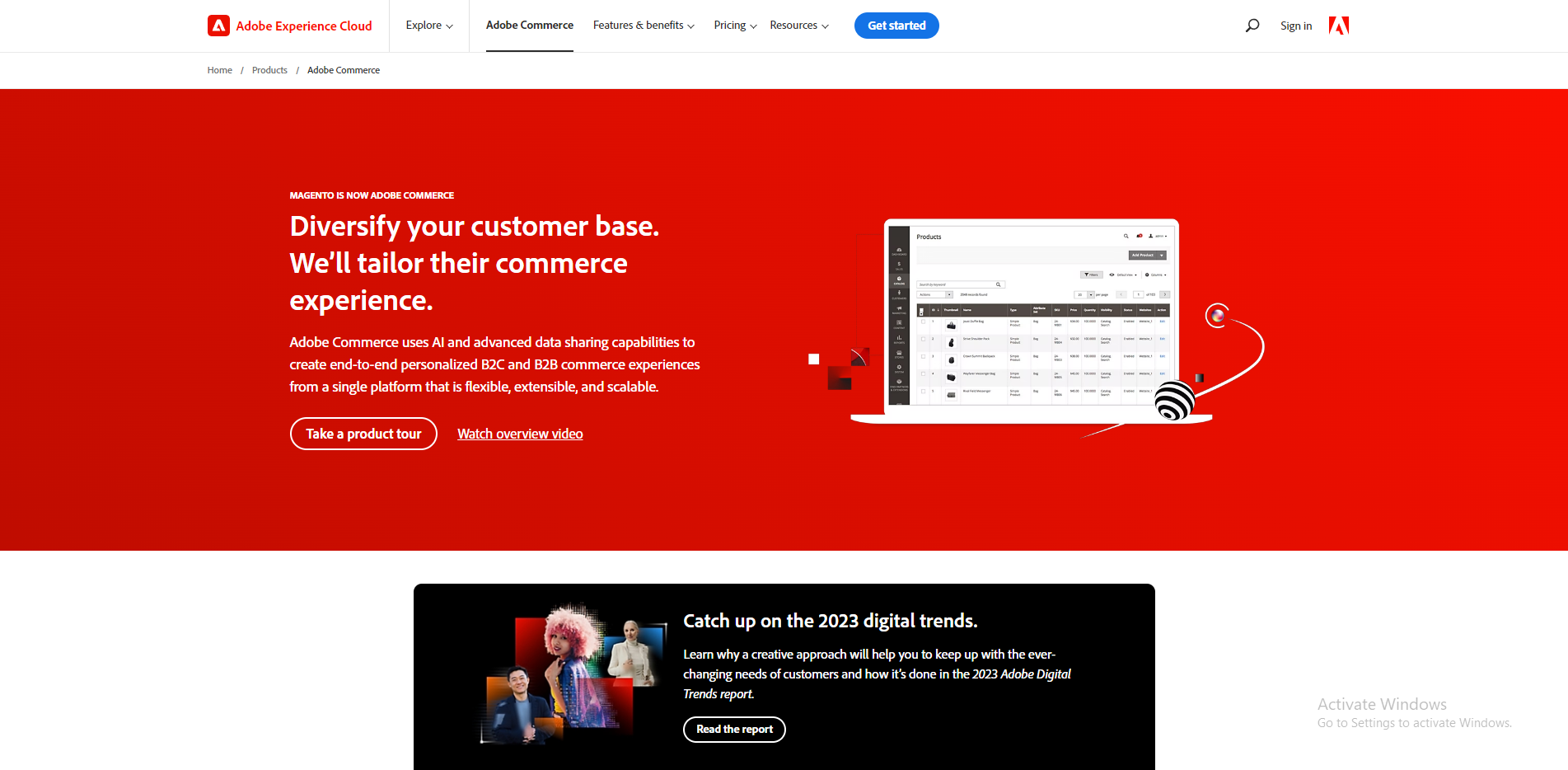Magento security best practices 2023, Adobe Commerce performance optimization, Ensuring data protection in Magento, Magento extension development guidelines
Adobe Commerce, which powers thousands of online stores, requires compliance with development guidelines and security policies to be successful. This post looks at Magento best practices and maintaining a secure eCommerce environment in 2023.
Introduction
Adobe Commerce, formerly known as Magento, is a powerful eCommerce platform used by many companies to create and manage online stores. Its modular architecture, flexibility, and extensive feature set make it a popular choice for businesses of all sizes. However, compliance with development guidelines and security regulations is crucial for a successful and secure online store in today’s competitive digital landscape.
The importance of development compliance cannot be overstated. Adhering to best practices such as coding standards, leveraging Magento components, and optimizing performance will result in a more reliable and maintainable eCommerce platform. By following guidelines, developers can avoid common pitfalls, improve code quality, and ensure compatibility with future updates. The result is a better user experience for customers that drives sales and customer loyalty.
Security policies play an essential role in protecting customer data and maintaining trust. Adobe Commerce store owners must prioritize data protection, secure payment processing, and GDPR compliance. In addition, compliance with industry regulations such as PCI-DSS helps minimize the risk of data breaches related to payments. At the same time, adherence to accessibility and ADA standards ensures an inclusive online shopping experience.
In 2023, it’s more important than ever to keep your Adobe Commerce store up-to-date with the latest security updates and vulnerability patches. Implementing strong admin panel security measures, conducting regular vulnerability scans and penetration tests, and enforcing role-based access control can help protect your store from cyber threats.
Adhering to Adobe Commerce development guidelines and security policies is essential to building a prosperous, secure, and comprehensive eCommerce platform. By following best practices, complying with industry regulations, and continuously improving your store’s security measures, you can deliver an exceptional shopping experience to your customers and gain a competitive advantage in the eCommerce landscape.
Let’s examine the security guidelines, compliances, and policies below.

Magento development best practices
Coding standards and conventions:
Adhering to Magento coding standards and PHP-FIG conventions, including PSR-1 (Basic Coding Standard), PSR-2 (Coding Style Guide), and PSR-4 (Autoloader Standard), ensures consistency and maintainability in your codebase. These conventions cover various aspects, such as class and method naming, indentation, control structures, and file organization. By following these guidelines, you improve the readability and maintainability of your code, facilitating collaboration among developers and reducing potential errors.
Proper use of Magento architecture and components:
Magento’s modular architecture enables greater flexibility in building and customizing your online store. To make the most of this flexibility, it’s essential to understand and adhere to Magento’s best practices. Key components to utilize include:
- Dependency Injection (DI): DI is a design pattern that promotes loose coupling between components by managing their dependencies. In Magento, use DI to instantiate classes and manage dependencies through XML configuration files.
- Model-View-ViewModel (MVVM): MVVM is an architectural pattern that separates an application’s logic, data, and presentation. In Magento, the model represents the data layer. The view represents the presentation layer, and the ViewModel, implemented as a block class, handles the interaction between the model and the view.
- Event-Driven Architecture (EDA): EDA is a design pattern where components communicate through events. In Magento, use EDA to trigger and observe events, allowing for decoupled and modular code.
Extension development tips:
Developing custom extensions is often necessary to meet specific business requirements. When creating extensions, adhere to the Magento Extension Quality Program (EQP) guidelines to ensure code quality, security, and performance. Key points to consider include the following:
- Following Magento coding standards and best practices.
- Ensuring compatibility with different Magento versions.
- Testing your extension thoroughly, including unit, integration, and functional tests.
- Always using the Magento API for data retrieval and manipulation, ensuring compatibility with future updates.
Performance optimization techniques:
A high-performing online store is crucial for customer satisfaction and conversion rates. Implement the following techniques to optimize your store:
- Caching: Utilize various caching mechanisms provided by Magento, including Full Page Cache (FPC), Block Cache, and Varnish Cache, to reduce server load and improve response times.
- Minimizing JS and CSS files: Merge and minify JavaScript and CSS files to reduce file sizes, decreasing the number of HTTP requests and improving page load times.
- Content Delivery Network (CDN): Implement a CDN to distribute static content across multiple servers, reducing latency and improving the user experience for global customers.
- Database performance and indexing: Regularly monitor and optimize database performance, using indexing to improve query execution times and ensure your store remains responsive.
Adobe Commerce Security Compliances
Adobe Commerce Security Compliances are critical in maintaining a secure and reliable eCommerce platform. These compliances address various security aspects, ensuring business and customer data protection.
Data protection and encryption
These are crucial to safeguard sensitive information, including customer details and transaction records. By implementing encryption algorithms, data is rendered unreadable, preventing unauthorized access and reducing the risk of data breaches.
Secure payment processing
It is essential for maintaining customer trust and complying with industry regulations. Implementing secure payment gateways and adhering to the Payment Card Industry Data Security Standard (PCI-DSS) helps protect sensitive payment data and minimize the risk of fraud.
Regular security updates and patching
It helps to address vulnerabilities and maintain the overall security of your Adobe Commerce store. By staying up-to-date with the latest patches and security releases, businesses can protect themselves against emerging threats and maintain a secure environment.
Safe handling of user information
This is crucial for privacy and regulatory compliance. Implementing access controls, securely storing user data, and following best practices for data handling help ensure compliance with privacy regulations such as the General Data Protection Regulation (GDPR).
Ensuring a secure Magento environment involves multiple layers of security measures, including secure hosting, SSL certificates, and robust admin panel security. These measures help protect your online store from potential attacks, ensuring a safe and seamless shopping experience for your customers.
How to ensure a secure Magento environment?
Ensuring a Secure Magento Environment involves implementing various security measures to protect your online store from potential threats and maintain a safe shopping experience for customers.
Secure hosting and SSL certificates:
Choose a reliable hosting provider with a proven security and performance track record. Secure hosting ensures your store is protected from server-level vulnerabilities. Additionally, implement SSL certificates to encrypt data transmitted between your website and users, providing a secure environment for sensitive information like payment details and login credentials.
Admin panel security measures:
Strengthen your store’s admin panel by employing strong, unique passwords and implementing two-factor authentication (2FA) to prevent unauthorized access. Limit the number of users with admin privileges and restrict access to specific IP addresses. Regularly monitor and audit admin user activity to identify potential security threats.
Vulnerability scanning and penetration testing:
Conduct regular vulnerability scans to identify potential security weaknesses in your Magento store. Use automated tools to scan for known vulnerabilities and follow up with manual testing to ensure comprehensive coverage. Additionally, perform penetration testing to simulate real-world attacks, allowing you to identify and address potential security risks proactively.
Role-based access control:
Implement role-based access control (RBAC) to manage access to sensitive data and system functions. RBAC allows you to assign permissions based on users’ roles within the organization, restricting access to only those who require it for their job responsibilities. Regularly review and update user roles and permissions to maintain the least privilege principle.
Staying Compliant with Industry Regulations
Staying compliant with industry regulations is crucial for online businesses to build customer trust and fulfill legal obligations.
PCI-DSS compliance for online payments:
Compliance with the Payment Card Industry Data Security Standard (PCI-DSS) is essential for businesses handling credit card information. Adhering to PCI-DSS guidelines helps protect sensitive payment data and reduce fraud risks. Compliance involves implementing robust encryption, access controls, regular vulnerability assessments, and maintaining a secure network.
GDPR and other privacy regulations:
The General Data Protection Regulation (GDPR) is a comprehensive privacy regulation applicable to businesses operating within the European Union or serving EU citizens. To comply with GDPR and similar privacy regulations, businesses need to obtain user consent for data collection, offer transparency on data usage, and ensure secure data storage and handling. Processes for data subject requests, such as access, rectification, and deletion of personal data, must also be in place.
Ensuring accessibility and ADA compliance:
The Americans with Disabilities Act (ADA) requires websites and online services to be accessible to individuals with disabilities. To ensure ADA compliance, design your online store with usability in mind for users with various impairments, including visual, auditory, motor, and cognitive disabilities. Implement features like keyboard navigation, screen reader compatibility, and alternative text for images to create an inclusive shopping experience and mitigate the risk of accessibility-related lawsuits.
Adobe commerce development and how to prepare for security compliance in the future?
Preparing for the Future in the eCommerce landscape involves staying updated, embracing innovation, and prioritizing security to maintain a successful and competitive online store.
Keeping up with Adobe Commerce updates and releases:
Regularly updating your Adobe Commerce store ensures access to the latest features, performance improvements, and security patches. Staying current with updates helps maintain a secure and high-performing online store, mitigating potential risks and enhancing user experience.
Adopting emerging eCommerce trends and technologies:
Embracing new trends and technologies in eCommerce can provide a competitive edge and boost sales. Stay informed about advancements in areas such as personalization, mobile commerce, and omnichannel strategies. Integrating innovative technologies like AI, chatbots, and augmented reality can enhance customer experience and drive growth.
Investing in regular security audits and training:
Regular security audits help identify potential vulnerabilities and assess the overall security of your online store. Conducting audits, vulnerability scans, and penetration testing allows you to address security risks proactively. Additionally, invest in training to ensure that your development and operations teams are well-versed in the latest security best practices and stay informed about emerging threats.
Conclusion
In conclusion, running a successful Adobe Commerce store in 2023 requires adherence to development guidelines and security compliances. Following Magento development best practices ensures your online store’s consistency, maintainability, and scalability. In addition, prioritizing security compliances, such as data protection, secure payment processing, and regular updates, helps maintain a secure and trustworthy eCommerce platform.
Preparing for the future entails staying updated with Adobe Commerce releases, embracing emerging trends and technologies, and investing in regular security audits and training. In addition, by emphasizing the importance of development guidelines and security compliances, businesses can ensure a thriving and secure Adobe Commerce store that meets customers’ evolving demands.
Don’t let the complexities of Adobe Commerce development and security compliance hold you back from achieving success in the eCommerce world. At eGlobe IT Solutions, our team of experts is ready to assist you in building and maintaining a secure, high-performing Adobe Commerce store that adheres to industry standards and regulations.
If you’re interested in learning more about how eGlobe IT Solutions can help you navigate the ever-evolving world of eCommerce, we encourage you to reach out to us for a consultation. Visit our website for more information and to get in touch with our team.



